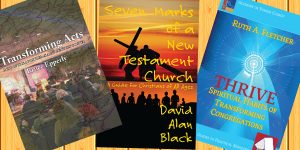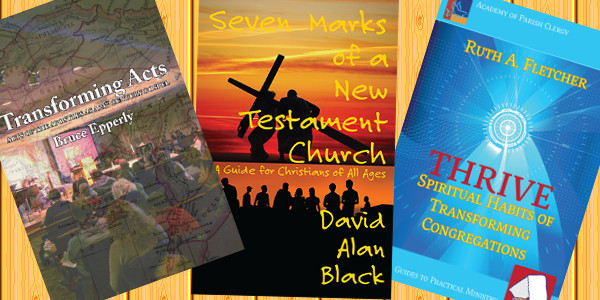Different People See Different Things in Acts
 In my current series on the church, starting from my interview with Dr. David Alan Black about his book Seven Marks of a New Testament Church, I’m bringing in material from two other authors: Bruce Epperly (Transforming Acts: Acts of the Apostles as a 21st Century Gospel) and Ruth Fletcher (Thrive: Spiritual Habits of Transforming Congregations). There are three major reasons (other than that I like and publish both books) that I’m using these two books.
In my current series on the church, starting from my interview with Dr. David Alan Black about his book Seven Marks of a New Testament Church, I’m bringing in material from two other authors: Bruce Epperly (Transforming Acts: Acts of the Apostles as a 21st Century Gospel) and Ruth Fletcher (Thrive: Spiritual Habits of Transforming Congregations). There are three major reasons (other than that I like and publish both books) that I’m using these two books.
- These two additional books show significant similarities in what they recommend for 21st century churches.
- These two additional books show significant differences in their recommendations.
- These two books show significant differences in the approach to finding the answers.
I want all of these differences and similarities to help stimulate people to their own study. I want to emphasize that though I’m friends with Dave Black and appreciate his work tremendously, I’m not trying to speak for him, nor am I simply trying to reiterate what he has to say in his book. What I’m doing is approaching his book as a member of a mainline congregation (I’m United Methodist), and asking what I should apply to my local congregation and how I should go about doing so. In fact, I hope that as I do this I’ll see more avenues for building up the spiritual life and discipleship of the church community I’m part of.
I’m not seeking uniformity, and I don’t think Dave is either. Two days after we taped that interview, he was preaching at the United Methodist church I now attend. He never asked any of us to become Baptists. But I’m not going to try to speak for him on any details. Uniformity is, I believe, one of the problems we have in the church. One of the mechanisms of uniformity is the church program. Repeatedly I have seen church members go out and learn about some program and then bring it back to their church. When they get back they are filled with the recommendations of the speaker, which often include the warning that if they don’t follow the program precisely things will go off the rails. So if a church already has an effective ministry to needy people, for example, there’s no option for combining the new things learned at the conference with what is already happening. We have to carry out the program.
I recall the introduction of a small group related program to a church that already had two different types of small groups. Over a period of years there was constant complaining that the church couldn’t get enough people involved in this new program to make it work. Nobody was willing to consider combining the new program with what was already going on. So people who were leading in small groups felt overwhelmed by the requirement to attend classes, carry out specific activities that didn’t mesh with what they were already doing, fill out reports, and attend administrative meetings. That’s one form of the effort to enforce uniformity. Uniformity can be of practice, of doctrine, of polity, and so forth.
I’ll outline the differences in recommendations as I go through my series, though I certainly won’t be able to cover all three books. I’ll recommend reading all three, then, as I think all three authors would recommend, prayerfully studying and discerning for yourself and for your community what God’s leading is in your particular case. Then don’t feel the need of reinventing the wheel because you have suddenly become one of the enlightened ones.
I do want to point out differences in approach. None of this is intended as a critique of any of the authors. These are, in fact, the strengths of each that led me to want to write a blog series based on these books.
Dr. Black is a biblical scholar, and he is not a pastor, nor does he plan to be. He will tell you that he’s a full time missionary. In churchese, one could say full-time minister of the gospel. In his book you’ll find primarily a study of the text on which the book is based, Acts 2:37-47. For those of us whose thinking is seasoned by the Wesleyan Quadrilateral, he’s on the scripture line and it’s foundational. It’s seasoned by experience, tradition is acknowledged, it’s tied together with reasoning, but it is always scripturally rooted.
Dr. Epperly is a former seminary professor and a church pastor. He works from the biblical text but spends more time both on theology and sociology. His book is liberally sprinkled with his personal experiences which he ties to the experiences he’s using from the book of Acts. You’ll read lots of texts in his book, but you’ll be asked to think about those text in a much broader context.
Dr. Fletcher started from the other direction. She looked at churches that were successfully ministering to their communities, churches that were thriving, and asked what were the things they had in common. Her spiritual practices are derived from that. But don’t imagine that there is no theological reflection or scripture involved in the final result.
I found great joy in publishing all three books and I invite you to reflect on these issues for a few posts. I hope this explains what I’m trying to accomplish.
